KingMike had a question about Zelda III A Link to the Past that seems to be an often-asked question by Zelda fans:
I’m sure I’m not the only who played ALttP since they were a kid and always wondered what Link’s uncle was trying to say about Zelda in the opening.
For reference, here are some screenshots (and thanks for taking them for me!):
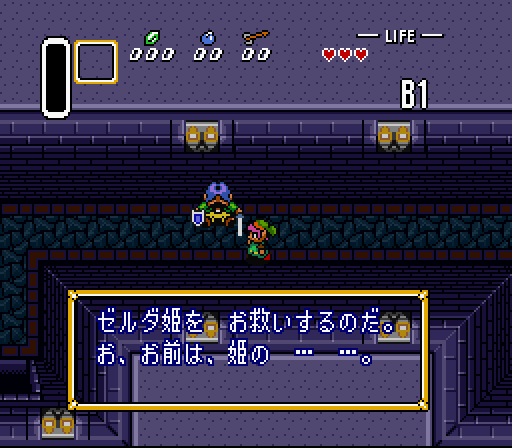 | 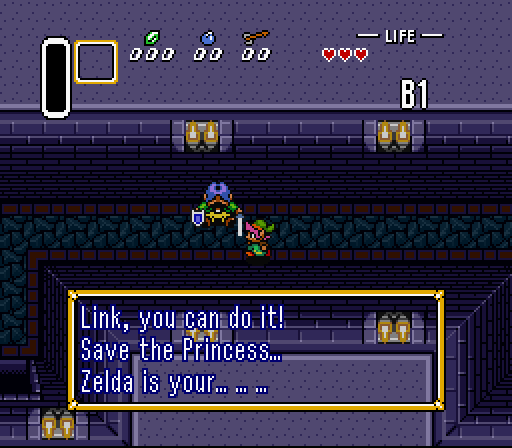 |
| Super Famicom version | Super NES version |
And here’s the text in full:
| Japanese text | Basic translation | Official translation |
| うう…。リンク、お前だけは まきこみたくなかった… | Uu… Link, you’re the one person I didn’t want to involve in this… | Unnh… Link, I didn’t want you involved in this… |
| 家を出るなと言ったのに… | I told you not to leave the house, and yet… | I told you not to leave the house… |
| …こ、この剣と盾を持って行け よくきけ… | …T-take this sword and shield and go. Listen well… | Take my sword and shield and listen. |
| Bボタンを押し続け 剣に力をためるのだ。 | Hold the B Button to fill the sword with power. | You can focus power in the blade (hold the B Button). |
| そうすれば、ある一族だけに 伝わる秘剣が使えるはずだ…。 | Do so, and you should be able to use the secret sword (technique) only passed down in a certain clan… | …Then release it using the secret technique handed down by our people… |
| リンクよ、お前ならできる… | Link. If anyone can do it, you can… | Link, you can do it! |
| ゼルダ姫を お救いするのだ。 | Rescue Princess Zelda. | Save the Princess… |
| お、お前は、姫の … …。 | Y-you are the princess’… … | Zelda is your… … … |
So it looks like the Japanese text ends on a bit of a cliffhanger too, except the sentence subjects have been switched – In Japanese, he says, “You are the princess’…” while in English he says the reverse with, “Zelda is your…” So the translation is sort of a backwards version of the original.
What he intended to say isn’t 100% clear in either version, but if I were playing this for the first time ever, my initial instinct says that he was planning to say, “You are the princess’ only hope.” in the Japanese version.
I have no idea what the English localization was trying to go for, and I suspect that the localization writers didn’t really know, either. It’s been a few years since I last played through the game in English – did the localization ever answer this mystery it started? I’m guessing probably not, if it’s something English-speaking fans are curious about. It’s interesting how just a simple subject swap can create such a big puzzle as this 😛
Actually, this makes me wonder how this line was handled in translations to other languages. Were they based on this English translation, or did they work from the Japanese text? If anyone knows, please share your insight in the comments!
I also couldn’t help but notice that the Japanese version says the special sword attack is passed down among a certain clan, while the English version says it’s “handed down by our people”. Off the top of my head I don’t know if that results in any significant differences in the backstory or series continuity or whatever, but I thought it was interesting enough to note.


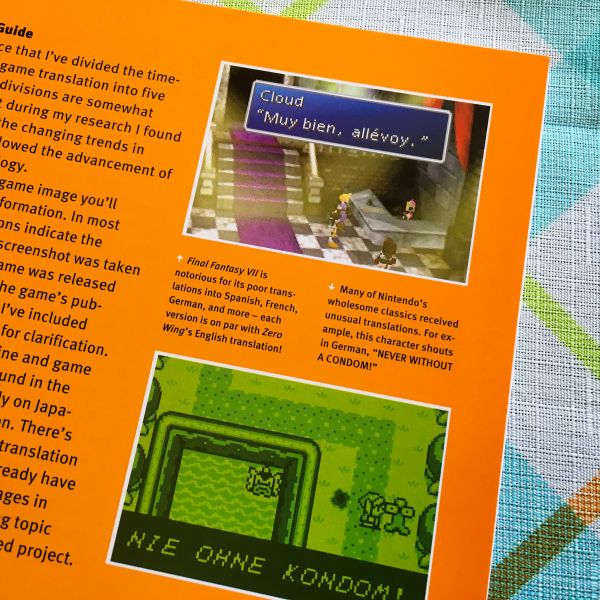
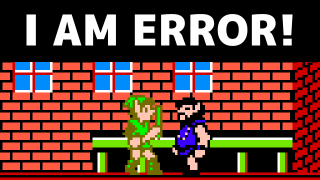
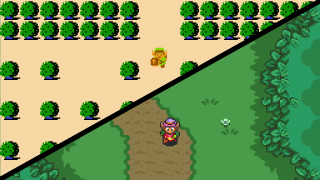
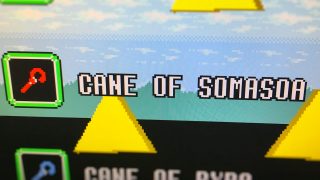
“If he says sister, I’ll kill him!” – Four Swords Misadventures
I always assumed he would have said, “Zelda is your… Destiny”, which kind of fits in with how you felt about the Japanese version, even though it still opposite of what was originally said.
As for the sword technique, I think that was probably just to clear it up that, yes, indeed, Link’s uncle knew the technique because they ARE descendants of the Hylia–which aren’t referred to as a “clan” at all in the English translation.
Me too!
I found this article through searching for the mystery as well. But I think everyone would assume (as I guess we here do) that Link’s uncle meant in the japanese version would be “You are the princess’ chosen knight.” and in english it would have been “Zelda is your destiny.” Too bad Miyamoto or any of the original development team never cleared this up.
Huh, I’d always heard the “Zelda is your” line was made up and had no basis in the original Japanese script, like Ganondorf Dragmire. The GBA port’s new translation removes the line entirely, and gives it instead to a boss in the new bonus dungeon that initially shape-shifts into Link’s uncle. It’d be cool if you could also compare the text from the GBA versions of both meeting Link’s uncle and the new boss.
Since you asked about the other localizations’ translations, I looked into a localization into Spanish. The speech is changed a bit, too.
“Oh…, ¿eres tú, Link?
¿No te dije que me esperaras en casa?…
Supongo que no puedes huir de tu destino… Toma, coge
mi espada y mi escudo.
Te enseñaré la técnica secreta que solo los Caballeros de
Hyrule conocen…
Mantén pulsado el Botón B para concentrar el poder en la hoja,
y suéltalo para descargarlo.
Link…, debes rescatar a la princesa Zelda y cumplir el
destino de nuestro linaje.
Pero procura no caer víctima…
del destino… Link…
Siempre recordaré…
el tiempo… juntos…”
Translated into English, this would be:
“Oh…, is that you, Link?
Didn’t I tell you to wait at home?…
I suppose you can’t escape your destiny…
Here, take my sword and my shield.
I will show you the secret technique only the Knights of
Hyrule know…
Hold down the B Button to
concentrate the power in the blade,
and release it to discharge it.
Link…, you must rescue Princess Zelda
and fulfill the destiny if your lineage.
But make sure you don’t fall victim…
to destiny… Link…
I’ll always remember…
our time… together…”
One thing to note is that, in Spanish, the same word is used for “fate” and “destiny”, so there are times when one word would be a better translation than the other.
Of course, the most obvious change is that the “Zelda is your…” line is removed. From this, I can assume they translated it directly from the Japanese, as “Zelda is your…” actually can translate to Spanish while preserving the cliffhanger (“Zelda es tu…”), but “You are the princess’…” doesn’t translate well (the presumed full sentence, “You are the princess’ only hope,” would translate into “Eres la última esperanza de la princesa”, in which the “only hope” and “princess'” are swapped.t
Another interesting thing is that the vague “clan/people” are replaced with “the Knights of Hyrule”. Make of that what you will.
I only just noticed a couple of spelling errors here and there. I’m typing on my phone, so sorry!
You typed all that on your phone? Dang, you’re good.
The GBA scripts for both English and Japanese versions were changed as well for that part! I remember clearly the “I’ll remember our time together” in the GBA English version.
And belive me, spanish translations in zelda games have even more confusing and same word translations for three or even four words in the same text in many games, thats why i learned english, to play the games with a less confusing (personally) lenguage.
Considering the similarity between the “so” and “ri” katakana glyphs, is it possible that the name was always intended to be “Somasoa”, and that someone’s real-world handwriting got misconstrued at some point, someone else reading the second “so” as a “ri”?
Yeah, that’s what I’m wondering too. I’d love to play the Japanese GBA version all the way through and get the cane normally to see what the text says when you acquire it. My hunch says it’ll be called “Somasoa” there too, in which case it would be less likely to be a typo/reading mistake.
I checked the text in the Japanese GBA version when you obtain it and it was changed to “Somasoa” there as well:
ソマソアのつえを手に入れた!
うまく使えば、とてもやくに
立つ、ふしぎなつえだ!
Cool, thanks! You didn’t happen to get a screenshot, did you? I always prefer to get screenshots as extra proof of stuff, in case either I mess up or someone thinks *I* got something wrong 😛
Here’s a screenshot: http://i.imgur.com/yR5Hrn4.png
I don’t know if it will suffice as it’s low-res and a little blurry being taken straight from a youtube video.
So I did some more research and it sounds like it IS “Somasoa” on purpose. Apparently after you finish the four dungeons (in four sword adventures? I dunno) it’ll tell you how many times you used each item, and when it shows this cane it says “SOMASOA” in English letters.
The Gameboy Advance English localization removes the “Zelda is your . . . ” line, if I remember right.
Cane of Baira, a cane that makes a magical barrier around you… cane of Baria, like the “Baria Suit” in Japanese Metroid, which in turn is linked to the word barrier?
Cane of Varia!
Yeah, that’s my guess too, that it’s a really roundabout scrambling of “Baria” (well, roundabout coming from the Japanese side of things).
The same ending that spells Cane of Somasoa, calls it Cane of Byra.
Given the relation of both items and how unambiguous transliterating “Byra” is, I’d say it’s probably that.
(Then again, it also calls the lamp “Kandelaar” and the MC Hammer “Magic Hammer”, so I’d question just how valid the quest log really is…)
In the Japanese version the Lamp when obtained is: カンテラ which apparently is borrowed from the dutch “Kandelaar.” In the Inventory it instead is: とうろう “Lantern.” The same goes for the hammer which is “Magic Hammer” in the inventory.
This is the case with many items in the Japanese version where they goes by slightly different names/spellings when obtained versus inventory screen. If it was by design or if it was simply down to different persons responsible for the text in the inventory versus game-script I don’t know.
Another such example are the three Pendants, in the inventory they goes by Pendants just like we’re used to but are only referred to as Crests in the game-script.
Oops! Nevermind seems I was wrong about the description of the Lantern in the inventory, it’s カンテラ there as well.
I always assumed that it was either “Zelda is your destiny,” or “Zelda is your only chance to save everyone/bring peace to the world.”
By the way, since we’re on the subject of older characters speaking (I know Link’s uncle isn’t that old, but let me go on), what exactly constitutes an “old man/woman” way of speaking in Japanese? And how exactly do you tell? Is the vocabulary? The tone of voice? (Though I know in older games, there’s no voice acting.)
They usually end their sentences with the word/phrase “ja” or “jaa”. It’s one of many ways to end a sentence in Japanese that doesn’t actually mean anything but is just there to reflect the speaker’s disposition.
Yeah, in written Japanese there are lots of little cues and word/verb usage differences that denote things like that. It’s such a big topic that I think I’d like to do a dedicated article to it sometime! Voice acting is another thing altogether, but just from written Japanese you can figure out a ton about a character.
That would be great. You mentioned numerous times about old man and woman speaking in the FF4 comparison columns, so I was curious. Then I remembered in some anime that I’ve seen, as Pickle pointed out, that some elderly characters say -ja often.
Then I recalled that Princess Devilotte from Cyberbots and Patty from the PS3 Tales of Vesperia say it despite they’re both little girls. And the other characters point out, “Kids/princesses shouldn’t be talking that way!” XD
Whenever I’ve played this, I thought he was trying to say “Zelda is your sister.”
Same here. The first time I read that line, I thought he was going to say that Zelda was Link’s sister, too. I had also believed that Link and Zelda were twins in Ocarina of Time, and that during the war of the races, the king kept Zelda in the castle while the queen fled with Link to the Kokiri Forest. That’s why Zelda says that her mother died while she was young and that Link’s name sounds familiar. Just my theory.
Oh my, that’s my theory too!
In French it reads:
“Tu…Peux…y arr…iver! Sauve Princ…Zeld… Tu es son… sauv…”
Which means:
“You…can..do…it! Save Princ…Zeld… You are her…savior…”
In the German version of ALttP (SNES) he says:
“Ahh, Link…, ich wollte dich nicht mit in diese Sache hineinziehen.
Aber warum hast du nicht auf mich gehört und bist im Haus geblieben?
Hier, nimm mein Schwert und das Schild und hör mir genau zu!
Unser Volk allein besitzt das geheimnisvolle Schwert mit besonderen Kräften.
(Halte den B-Knopf gedrückt, um die Kraft zu sammeln und lass los, um zuzuschlagen)
Bitte, Link,… hilf mir, mein Ende ist gekommen…
Rette die Prinzessin! Sie hat nur noch dich!
Ahh… mein Ende naht…
Die Prinzessin… Du bist ihr…”
which roughly translates to:
“Ahh, Link… I didn’t want to drag you into this matter.
But why didn’t you listen to me and stayed inside the house?
Here, take my sword and shield and listen closely!
Our people alone possess the mysterious sword with special powers.
(Hold down the B Button to gain power and let go to strike)
Please, Link… help me, my end has come…
Save the princess! She only has you!
Ahh… my end is near…
The princess… You’re her…”
So, it’s a little closer to the Japanese version concerning the last sentence, although with saying “Du bist ihr…” the translator pretty much ruled out the possibilty to interpret it as “her last hope” as hope is a female object in German and requires to use “ihre” instead of “ihr”.
Other than that, I’m really surprised how different the German version is compared to the English and Japanese one. The people not passing down a technique but the whole sword itself is just one example, which leads to him not even mentioning the technique (as it is put in parantheses). I have to say, it was handled pretty well with excluding the technique as a whole, but it still changes things. Plus I have no idea why they had the urge to do that.
Oh, in the GBA version, he says this:
“Unnh… Diese Stimme! Link?
Bist du es? Ich habe dir doch gesagt, du sollst zu Hause bleiben!
Nun, man kann seiner Bestimmung wohl nicht entfliehen…
Hier, nimm dieses Schwert und den Schild.
Ich werde dich nun eine der geheimen Schwerttechniken der Ritter von Hyrule lehren…
Halte B gedrückt, um die Klinge mit Energie aufzuladen. Lass los, um die Kraft freizusetzen.
Link… Du musst Prinzessin Zelda retten! Es ist das Schicksal unseres Geschlechts!
Doch werde nicht Opfer… dieses Schicksals… Link…
Niemals werde ich unsere… gemeinsame Zeit vergessen…”
which roughly translates to this:
“Unnh… This voice! Link?
Is that you? I told you to stay at home!
Well, it seems you can’t escape from your destiny…
Here, take this sword and shield.
I will now teach you one of the secret sword techniques of the Knights of Hyrule…
Hold down B to charge up the blade with energy. Let go to release the power.
Link… You have to save Princess Zelda! It’s the fate of our lineage!
But don’t be a victim… of this fate… Link…
I will never… forget our time together…”
Pretty funny that Link’s voice is mentioned here as he doesn’t really speak…
Other than that it is pretty similar to the Spanish one, I’d say. I don’t know much about the English GBA version though.
This is the English GBA script:
Unnh… That voice… Link?
Is it you? I thought I told you
to wait at home…
I suppose there’s no escaping
destiny… Here, take this
sword and shield from me.
I shall teach you one of the
secret sword techniques used
by the Knights of Hyrule…
Hold the B Button to focus
power in your blade. Release it
to unleash the power.
Link…you must rescue
Princess Zelda. Our people are
fated to do so.
But do not fall victim…
to fate… Link…
I shall always remember…
our time… together…
And even the Japanese text in the GBA release was completely rewritten. In comparaison, the GBA English text still is the SNES English script, albeit heavily edited.
I think it would warrant a second look.
I really regret not learning German. I heard about Moyse, the German Nintendo translator, taking lots of liberties with the script of games he handles. He replaced apparently the text on one of the signs in Link’s Awakening (that originally had just directions for the next dungeon) in one area infested with slimes, with something like “Kids, don’t forget to use condoms!”.
I heard though he did a censored translation for Terranigma, kind of like when 4Kids tones down the violence and says “Here, no one died!”. But I’d love to check it out myself.
There’s a polish fan translation of ALttP. It says “Zelda jest twoją … …”, and it literally means “Zelda is your…”, so nothing interesting, really. I guess it’s like that because obviously more people know english than japanese in Poland, so they used the US release as a base (which, in fact, they did).
Keep up the good work with all of your articles btw!
I guess there is no basis for this, but I always assumed that “SoMARIa” was a Mario reference – kind of like tARIn in ALTTP (obviously Mario based character) or like KaliMARI/KOOPAhari desert in Mario Kart, etc.
Oops, I mean Link’s Awakening, not ALTTP…
I was always confused by the “Zelda is your…” line in the this game as well but looking back at it, though my first guess was also “Zelda is your destiny,” I think what they were going for was something along the lines of, “Zelda is your responsibility.” Perhaps there was a different word there but that would be my guess as that preserves the supposed intent of the Japanese text. I would wonder too if part of the reason the line was cut in the re-release on GBA is due to no one really knowing for sure what the line was intended to imply (like the original notes on that part of the script are lost). So rather than perpetuate a bad translation or further mutilate the original intent they just removed the line altogether.
Surely it’s “princess’s”, not “princess'”?
This is one of those grammar rules that everyone learns differently. Both are valid, just a matter of preference.
Huh, you’re right! http://en.wikipedia.org/wiki/Apostrophe#Singular_nouns_ending_with_an_.E2.80.9Cs.E2.80.9D_or_.E2.80.9Cz.E2.80.9D_sound
if you were so curious about how to romanize バイラ, couldn’t you have just gotten it off of the GBA ending too?
And just as an aside, I wouldn’t say “Japanese names are hard” so much as that Japanese transliterations of a western language are hard. Seriously, there’s practically no consistency at all when it comes to usage of the Latin alphabet (especially in English), so you could have like 500 different spellings that are all capable of having the exact some pronunciation, and then you got stuff like ghoti=fish. Shit, just look at the official roman spellings of characters from Fire Emblem, I doubt anyone’d be able to guess half of those. Then you’ve got Odin Sphere, which has a character who goes by the spelling of “Ingway” in the English localization, but his official name, according to the original creators? Yngwie (and to further complicate things, the “w” is pronounced like a “v” in the Japanese dub, イングヴェイ, though the English voice cast apparently didn’t catch onto this and pronounces it with a standard “w”). I’m also left to wonder how Pokemon got “Shaymin” from シェイミ (have you ever heard of a silent “n” from any culture?).
So, your comment is over five years old but I felt I’d weigh in. “Shaymin” is also an irregular pronunciation of “shaman”, which the Pokemon sort of is (depending on the continuity). It’s a herbalist at any rate.
I’m pretty sure that ‘Zelda is your…’ line got changed in the English GBA version actually! Now I’m wondering if this is the same for the Japanese version too but I might be wrong in the first place.
I know that this post is really old, but I looked into the Italian localization. Since the SNES version was never localised, I’m going straight with the GBA version.
“Oh, no, Link, non volevo che tu fossi coinvolto… ti avevo detto di rimanere a casa…
Prendi la mia spada e lo scudo.
Ora ascoltami, voglio insegnarti una tecnica segreta tramandata dal nostro popolo: puoi concentrare tutta l’energia nella lama della spada tenendo premuto il pulsante B per sprigionarla poi in un sol colpo.
Imparala presto, ti sarà utile.
Link, puoi farcela!
Salva la Principessa…
Non ti dimenticherò…”
The translation goes something like this: “Oh no, Link, I didn’t want you to get involved in this… I told you to stay at home…
Take my sword and shield.
Now listen, I want to teach you a secret technique handed down by our people: you can focus all the energy in the blade of your sword by pressing the B button and then release it all together in a single hit. Master this technique quickly, it will be helpful.
Link, you can do it!
Save the princess…
I’ll never forget you…”
I really don’t like the Italian translation because the whole ‘destiny’ theme is completely gone…
That “it is handed down by our people” thing did come up in the rest of the game. Because the legendary hero is descended from the same family, the descendant of the “hero of Hyrule”, that spin technique is taught by that particular clan’s ancestors. I think in the Zelda 3 game they specifically call them the “Hylia” but it’s been a while. But yes, that line does have story implications and it’s this thing about that Link being the legendary hero was is descended from the legendary hero and on and on, and therefore will be the Chosen Child of Faore and all that.
At the time I first played this game I didn’t know what the line meant, but now I’m tempted to think it means that Link is kin to Zelda because according to Skyward Sword that Link and Zelda started the lines that would eventually be the “hero” and “princess” chosen ones, so there’s a connection there in greater Zelda lore, but in Japan it probably had to do with Link being the chosen one who was supposed to protect/save the princess (since that doesn’t take twenty-five years to solve and is, in fact, stated directly in the same game).
In A Link to the Past specifically, independent of any lore established in later games, Link is referred to as the last descendent of the Knights of Hyrule from the time of the Hylia. I don’t recall any mention of a past legendary hero he descended from, only a prophecy that the legendary hero would come from the Knights of Hyrule, a prophecy that Link is fulfilling within the game itself.
There might have been more in the manual, but this is how it was presented within the game, at least.